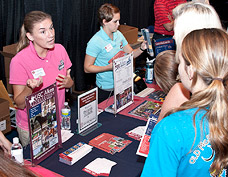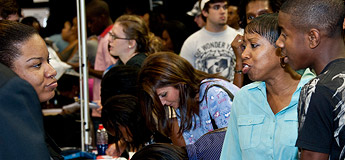|
|
Information
for Students and Parents
| SAVE THE DATE - 2021 CSRA Virtual College Fair |
November 4, 2021 • 5:00 PM - 8:30 PM • Details to follow
|
Faring Well at College Fairs
 As you walk through
the doors, the noise is overwhelming. People cluster around
what seems like hundreds of tables, filling out cards, leafing
through brochures, and competing for the attention of nicely
dressed admission representatives. This could be it, you think.
You could find your dream college in this very room. As you walk through
the doors, the noise is overwhelming. People cluster around
what seems like hundreds of tables, filling out cards, leafing
through brochures, and competing for the attention of nicely
dressed admission representatives. This could be it, you think.
You could find your dream college in this very room.
College fairs are
an exciting chance to talk to the people in the know. Admission
representatives from a variety of colleges are all gathered
in one place, just waiting to answer your questions. But it's
easy to get caught up in the crowds and confusion. Soon you're
criss-crossing the room (or many rooms), stopping at any booth
that catches your eye or seems popular. When that happens,
you end up with lots of pretty brochures, but not a lot of
clear impressions about which colleges you may be interested
in. Making the most of a college fair means planning your
strategy before you enter those double doors. |
Making
a list and checking it--well, you know |
"Treat a college fair like a buffet dinner," advises
Susan Hallenbeck, director of undergraduate admission at Saint
Leo University (FL). "There will be more there than you
can possibly take in, but then again, not everything is to
your taste."
Experienced buffet
diners know that it's best to scope out their choices before
they start filling their plate. Savvy students can do the
equivalent by looking over a list of college fair participants
before the fair. Choose the colleges you most want to find
out more about. If you have time, research these colleges
by reading information in your guidance office or by checking
out guidebooks or Web sites.
"Know what
you want to find out at the fair," says Paul Marthers,
director of admission at Oberlin College (OH). Write up a
short list of questions to ask admission representatives.
To compare several schools, plan on asking the same questions
at each table.
The questions you
ask should be unique to your interests and not easily found
in standard college materials. "The college fair is a
good time to talk person-to-person with the representative
|
of that school," says Janet Helfers, guidance counselor
at Mariemont High School (OH). "Your job is to think
of good questions."
So cross out the
questions like, "How many people are in the freshman
class?" Instead, ask what the two or three most popular
majors are (that can give you a good idea of the main interests
of the majority of the students). If you have a particular
major in mind, don't ask "How good is major X?"
No college representative will tell you that a program is
bad. Instead, ask how many students take that major; what
research faculty members are involved in (and the opportunities
for undergraduates to participate in it); or what courses
you would take your first year in a particular major. Students
who are undecided should ask about what services and support
are available to help them explore various majors.
Other things you
can ask about: extracurricular activities, what kinds of students
the college is looking for, what percentage of students receive
financial aid, and other concerns unique to your interests
and situation. |
Mapping
out a strategy |
RETURN TO TOP |
 Before you leave for the fair, make sure you have the following
supplies: a small notebook with your list of colleges and
questions you want to ask; a pen or pencil; and a backpack
or tote-bag to hold all of the college information you'll
be collecting. Before you leave for the fair, make sure you have the following
supplies: a small notebook with your list of colleges and
questions you want to ask; a pen or pencil; and a backpack
or tote-bag to hold all of the college information you'll
be collecting.
Students with access
to computers may wish to print up a few sheets of self-stick
address labels. Include your name, address, phone number,
e-mail address, high school, year of graduation, intended
major(s), and any extracurricular activities you're interested
in. At the fair, slap the address labels on the college information
cards to save you time in filling out the same information
over and over at each college's table.
The real strategizing
begins when you arrive at the fair. Look for a map of where
each college is located. If it's a relatively small |
fair,
all the tables may be in one large room, like a school gym.
At big fairs, like NACAC's National College Fairs, hundreds
of colleges may be spread over many rooms and even in different
buildings.
Especially at the
larger fairs, it's important to map out your route. Note where
each college is located and plan the most efficient way to
visit the colleges on your list. (For example, you want to
make sure to visit all the colleges of interest to you in
one room before moving to the next.) Also, make sure to check
out the schedule of information sessions: many fairs have
sessions on the search process, applications, financial aid,
and other issues run by experts in the field. These sessions
are a great place to ask general questions about the college
admission process.
Your notebook and
pen are great tools for keeping all those conversations straight.
After you leave a table, jot down your impressions of the
college and the answers the admission representatives gave
you. Try to do this before you visit the next table, while
your impressions are still fresh. |
Teaming
up |
|
Depending on the time of day of the fair, both students and
parents may be encouraged to attend. If a family member attends
the fair with you, talk about your plan ahead of time. You
may decide to split up--perhaps a parent can attend the financial
aid seminar so you can visit more colleges. Another |
option
is staying together for part or all of time. You may find
that your parents or siblings ask different questions than
you do. Also, it can be helpful to get a second opinion on
your impressions of particular colleges. |
Browsing |
 Planning ahead ensures that you get to visit the colleges
that most interest you. But also make sure to leave time for
browsing. Planning ahead ensures that you get to visit the colleges
that most interest you. But also make sure to leave time for
browsing.
"Be adventurous!
Don't just focus on 'name' schools," says Hallenbeck.
"You may find that a school you've never heard of offers
the exact major, extracurricular program, etc., that you're
seeking." |
Following
up |
|
By the time the fair is over, you'll have a bag filled with
information about colleges--and a possible case of information
overload. Don't succumb to the temptation of just piling all
those brochures in some obscure corner of your bedroom. If
you're feeling overwhelmed, take a day or two away from the
college search. Then get out all of those brochures, along
with |
the notes you took while at the fair, and read through
them. You may find that some colleges aren't as interesting
as you first thought. Others only look better the more you
research them. For those colleges, follow up by filling out
the information cards in the brochures or by starting to schedule
college visits. |
Source:
National Association for College Admission Counseling
RETURN TO TOP
|

 As you walk through
the doors, the noise is overwhelming. People cluster around
what seems like hundreds of tables, filling out cards, leafing
through brochures, and competing for the attention of nicely
dressed admission representatives. This could be it, you think.
You could find your dream college in this very room.
As you walk through
the doors, the noise is overwhelming. People cluster around
what seems like hundreds of tables, filling out cards, leafing
through brochures, and competing for the attention of nicely
dressed admission representatives. This could be it, you think.
You could find your dream college in this very room.  Before you leave for the fair, make sure you have the following
supplies: a small notebook with your list of colleges and
questions you want to ask; a pen or pencil; and a backpack
or tote-bag to hold all of the college information you'll
be collecting.
Before you leave for the fair, make sure you have the following
supplies: a small notebook with your list of colleges and
questions you want to ask; a pen or pencil; and a backpack
or tote-bag to hold all of the college information you'll
be collecting.  Planning ahead ensures that you get to visit the colleges
that most interest you. But also make sure to leave time for
browsing.
Planning ahead ensures that you get to visit the colleges
that most interest you. But also make sure to leave time for
browsing.